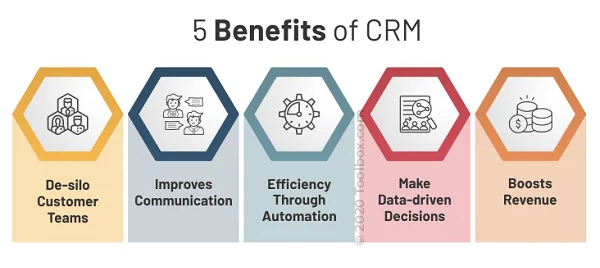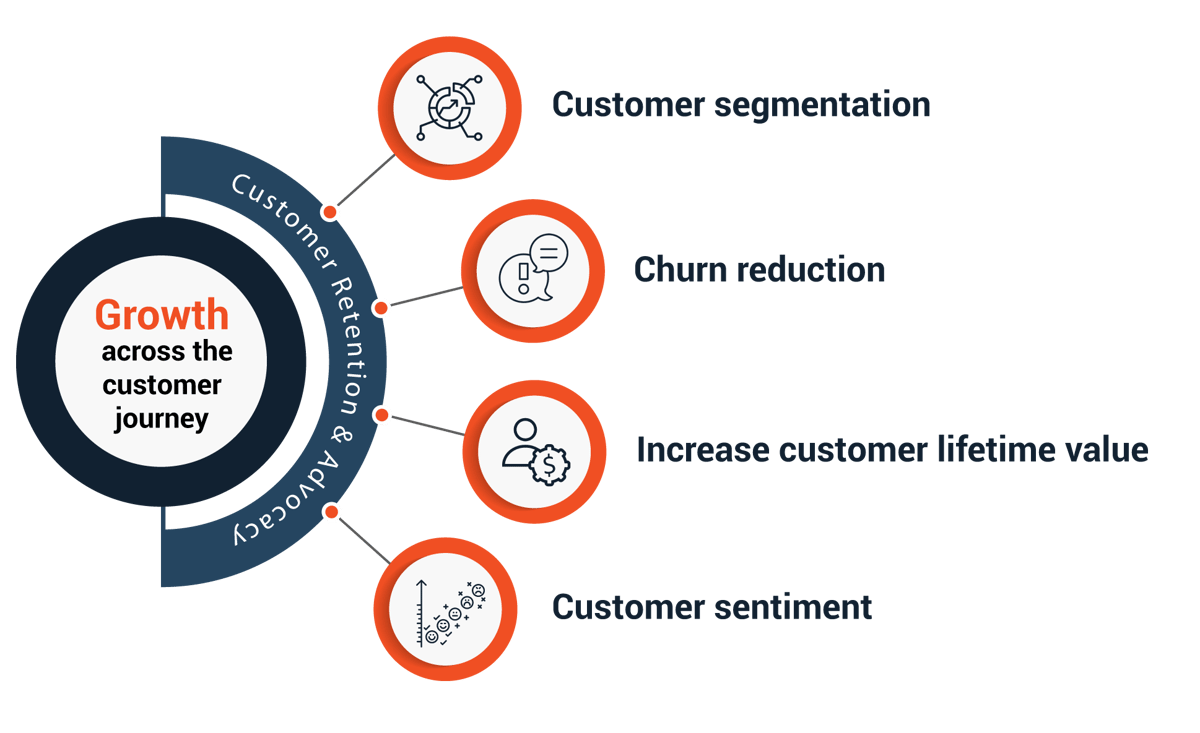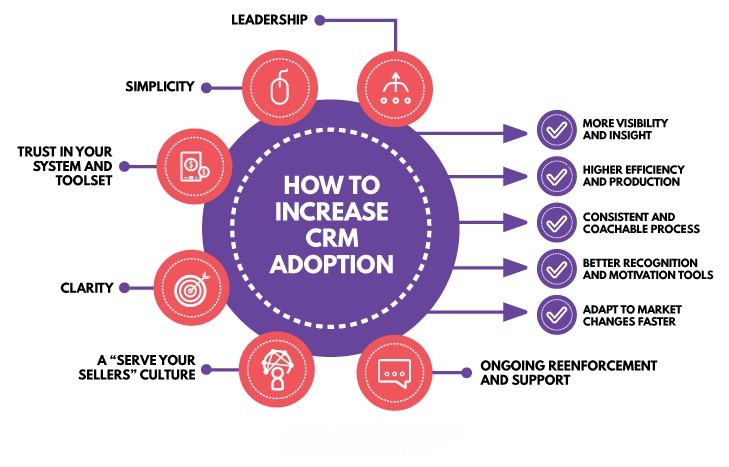In today's highly competitive business landscape, nurturing prospects and retaining customers is crucial for sustained success. That's where CRM solutions come into play. In this blog post, we will explore how CRM solutions can help you effectively nurture prospects, build stronger customer relationships, and ultimately drive business growth. We'll also discuss the factors to consider when choosing the right CRM solution for your organisation and provide useful tips on optimising its usage.
Understanding CRM Solutions
CRM solutions are software tools that help businesses manage their relationships with customers. These solutions provide a centralized platform for storing customer data, tracking interactions, and analyzing customer behavior. By implementing CRM software, businesses can streamline their management processes and improve customer satisfaction.
CRM solutions provide valuable insights into customer behavior, allowing businesses to tailor their marketing efforts and build stronger relationships that lead to increased loyalty and repeat business.
Effective relationship management is crucial for nurturing prospects and retaining customers. CRM solutions enable businesses to track every interaction with customers and analyse the data to identify patterns or trends. This valuable insight helps companies tailor their marketing efforts, personalize customer experiences, and build stronger relationships that lead to increased loyalty and repeat business.
What is CRM?
CRM, or Customer Relationship Management, is a software management system that helps businesses build and maintain strong relationships with their customers. It allows companies to effectively track customer interactions and data, analyze buying patterns, and provide personalized experiences. With key features such as contact management, sales tracking, and customer service tools, CRM enhances customer relationships by enabling targeted marketing campaigns, improving communication efficiency, and fostering long-term loyalty.
- Definition and purpose of CRM
- Key features of a CRM system
- How CRM enhances customer relationships

The Benefits of CRM Solutions
Improved customer engagement and satisfaction are key benefits of implementing CRM solutions. With the use of CRM software, businesses can effectively manage their relationships with customers, ensuring personalized interactions and timely follow-ups. This leads to increased customer loyalty and higher levels of satisfaction.
In addition, CRM solutions enhance sales and marketing efficiency by providing a centralized platform for tracking leads, managing pipelines, and automating repetitive tasks. Sales teams can easily access relevant information about prospects, improving conversion rates and closing deals faster. Marketing efforts become more targeted as data-driven insights enable precise segmentation and tailored messaging.
Moreover, CRM solutions streamline communication and collaboration across departments. By having a single source of truth for customer data, employees from different teams can work together seamlessly to provide cohesive support throughout the entire customer journey. This results in improved coordination between sales, marketing, and customer service departments while ensuring consistent communication with clients.
Types of CRM Solutions
Operational CRMs for Sales Force Automation (SFA) streamline sales processes, allowing businesses to efficiently manage leads, contacts, and opportunities. By automating tasks such as lead generation and order tracking, SFA software enhances the relationship between sales teams and prospects/customers.
Analytical CRMs for data-driven insights provide businesses with valuable information that can be used to make strategic decisions. Through advanced analytics and reporting capabilities, these CRM solutions enable organizations to understand customer behavior patterns, identify trends, and optimize their marketing strategies accordingly.
Collaborative CRMs foster enhanced team collaboration by providing a centralized platform where employees can share information in real-time. With features like project management tools and communication channels, collaborative CRM software promotes efficient teamwork while strengthening overall client relationship management.
- Streamline sales processes
- Automate lead generation
- Enhance data-driven decision-making
- Foster real-time collaboration

Nurturing Prospects with CRM
Capturing and tracking leads is crucial for nurturing prospects with CRM. By implementing a robust CRM solution, businesses can efficiently capture lead information and track the progress of each prospect. This allows sales teams to stay organized, prioritize their efforts, and tailor their approach to individual prospects.
Personalizing communication is another key aspect of nurturing prospects with CRM. With the help of advanced data analysis capabilities in CRM systems, businesses can gather valuable insights about their prospects' preferences and behaviors. Armed with this knowledge, they can create personalized messages that resonate with each prospect on a deeper level, increasing the chances of conversion.
Automating follow-ups streamlines the nurturing process by ensuring timely engagement with prospects. Through automation features offered by CRMs, businesses can set up customized workflows that trigger automated follow-up actions based on predefined criteria or event triggers. This saves time and effort while maintaining consistent communication throughout the customer journey.
Capturing and Tracking Leads
Lead generation strategies are crucial for capturing and tracking leads effectively. By implementing various tactics such as content marketing, social media advertising, and email campaigns, businesses can attract potential customers and gather valuable information.
Lead scoring and qualification helps prioritize leads based on their level of interest and likelihood to convert. By assigning scores to different actions or behaviors, businesses can focus their efforts on the most qualified prospects, increasing conversion rates and efficiency.
Integration with marketing automation tools streamlines the lead capture process by automating tasks such as data entry, lead nurturing workflows, and personalized communication. This integration ensures a seamless transition from lead generation to customer retention while saving time and resources for business teams.
Personalizing Communication
Segmentation based on customer data allows businesses to categorize their customers into different groups based on various factors such as demographics, purchasing behavior, and interests. This enables companies to create targeted marketing campaigns that resonate with each segment's specific needs and preferences.
Dynamic content customization takes personalization a step further by tailoring the content of marketing materials in real-time. By leveraging data analytics and automation tools, businesses can deliver highly relevant messages to individual customers, increasing engagement and conversion rates.
Behavioural tracking plays a crucial role in understanding customer preferences and providing personalised recommendations. By monitoring customer interactions with websites, emails, and other touchpoints, businesses gain valuable insights that help them anticipate needs and offer tailored suggestions for products or services.
Automating Follow-Ups
- Triggered email campaigns enhance customer engagement and increase conversion rates.
- Scheduled reminders for the sales team ensure timely follow-ups, improving efficiency and closing deals faster.
- Workflow automation streamlines the follow-up process, allowing businesses to focus on nurturing prospects and retaining customers.
Retaining Customers with CRM
CRM solutions play a crucial role in nurturing prospects and retaining customers. By building strong customer relationships, businesses can foster loyalty and increase customer retention rates. Additionally, providing exceptional customer support ensures that customers feel valued and supported throughout their journey with the company. Analyzing customer data enables businesses to gain insights into their behaviors and preferences, allowing for targeted marketing strategies that further enhance the overall customer experience. With CRM solutions at the helm, businesses have the tools necessary to retain customers effectively.
How CRM Solutions Can Nurture Prospects and Retain Customers
In today's competitive market, maintaining strong relationships with customers is essential for business success. CRM solutions provide valuable tools for building these relationships by enabling personalized interactions based on individual preferences and behaviors. By leveraging this technology to deliver exceptional customer support, businesses can create an environment where customers feel heard, valued, and supported at every stage of their journey. Furthermore, analyzing customer data allows companies to better understand their target audience's needs and desires so they can tailor marketing efforts accordingly; ultimately resulting in increased satisfaction levels among existing clientele while attracting new ones as well.

Building Strong Customer Relationships
Personalized communication is key in building strong customer relationships. By tailoring your messages to each individual customer, you can create a more meaningful and personalized experience that resonates with them on a deeper level.
Timely follow-ups demonstrate your commitment to customer satisfaction. Promptly addressing their inquiries or concerns shows that you value their time and are eager to provide assistance, fostering trust and loyalty.
Effective lead nurturing involves staying engaged with potential customers throughout the buying process. By providing relevant information and guiding them towards making informed decisions, you can build credibility while positioning yourself as a trusted advisor in their journey towards becoming loyal customers.
Providing Exceptional Customer Support
Omnichannel support ensures that customers can reach out through various platforms, such as phone, email, and social media. This seamless experience allows for efficient communication and quick issue resolution. With quick response times, customers feel valued and appreciated as their concerns are addressed promptly. Proactively resolving issues before they escalate demonstrates an exceptional level of customer support that goes above and beyond expectations. By leveraging CRM solutions to track customer interactions and anticipate needs, businesses can achieve unparalleled customer satisfaction.
Analyzing Customer Data
Segmentation and targeting are essential in analyzing customer data. By categorizing customers based on their demographics, behaviors, and preferences, businesses can tailor their marketing strategies to specific segments, increasing the likelihood of converting prospects into loyal customers.
Identifying cross-selling opportunities is another valuable aspect of customer data analysis. By analyzing purchase history and consumer behavior patterns, businesses can identify products or services that are frequently bought together. This allows them to create targeted cross-selling campaigns that maximize sales potential and enhance the overall customer experience.
Utilizing predictive analytics is a game-changer for improving sales. By leveraging historical data and statistical models, businesses can forecast future buying trends with a high degree of accuracy. This enables them to optimize inventory management, personalize marketing efforts, and make proactive decisions that drive revenue growth while meeting customer demands effectively.
Choosing the Right CRM Solution
Determining your business needs is crucial when choosing a CRM solution. Consider factors like sales volume, customer base, and specific industry requirements to identify the functionalities and features that are essential for your organization. Additionally, evaluating your current processes and pain points will help you pinpoint areas where a CRM system can provide the most value.
When evaluating CRM vendors, it's important to look beyond just the software itself. Consider factors such as vendor reputation, customer support capabilities, customization options, integration possibilities with existing systems, and scalability for future growth. Engaging in thorough research and due diligence will ensure that you select a CRM solution that aligns with both your immediate needs and long-term business goals.
Determining Your Business Needs
Identifying your goals and objectives is crucial when determining your business needs. By clearly defining what you want to achieve, you can align your CRM solution with these objectives and ensure that it addresses your specific requirements. Additionally, assessing your current sales and marketing processes allows you to identify areas of improvement where a CRM system can streamline operations and enhance efficiency. Moreover, analyzing the specific pain points in customer management enables you to pinpoint the challenges that need to be addressed by a CRM solution, such as enhancing customer engagement or improving data management capabilities.
Considerations for CRM Implementation
Evaluate the scalability of the CRM solution to ensure it can accommodate your business growth and increasing customer base. Assess integration capabilities with existing software systems to streamline processes and data management across different departments. Consider implementing robust data security measures to protect sensitive customer information from unauthorized access or breaches.
Evaluating CRM Vendors
Researching the reputation and track record of CRM vendors is crucial in making an informed choice. Look for customer reviews, case studies, and testimonials to gain insights into their past performance and credibility.
When evaluating CRM vendors, it's essential to compare pricing models and total cost of ownership. Consider not only the upfront costs but also ongoing expenses such as maintenance fees, customization charges, and potential add-ons.
Additionally, carefully review the available customer support options offered by CRM vendors. Ensure that they provide timely assistance through various channels like phone support, email tickets, live chat or self-service knowledge bases to address any issues that may arise during implementation or usage of the software.
Remember: Thoroughly researching vendor reputation ensures a trustworthy partnership while comparing pricing models helps manage costs effectively; Lastly reviewing available customer support options guarantees reliable assistance throughout your CRM journey.
Optimizing CRM Usage
Training and onboarding are crucial for optimizing CRM usage. By providing comprehensive training to new users, you can ensure they understand how to effectively utilize the CRM system from the start. Additionally, ongoing training sessions can be beneficial in keeping users up-to-date with any changes or updates to the CRM software.
Monitoring and measuring performance is key in maximizing the benefits of a CRM system. Regularly analyzing data and metrics allows businesses to identify areas of improvement and implement targeted strategies for nurturing prospects and retaining customers. By tracking key performance indicators, such as conversion rates or customer satisfaction scores, organizations can make informed decisions based on actionable insights.
Regularly updating and maintaining your CRM is essential for its continued effectiveness. This includes regularly reviewing data quality, removing duplicate records, and ensuring that all information is accurate and up-to-date. By regularly cleaning your database and performing routine maintenance tasks, you can optimize your CRM's functionality while avoiding issues caused by outdated or incorrect data entries.
Remembering these best practices will help businesses harness the full potential of their CRM systems. From initial training to ongoing monitoring to consistent updates – each step contributes towards nurturing prospects into loyal customers while propelling business growth forward.

Training and Onboarding
Customized training programs are essential for CRM users to maximize the benefits of the system. These programs provide tailored guidance and instruction on how to effectively use the CRM features. Interactive onboarding sessions further enhance user familiarity with the CRM, allowing them to explore its various functionalities hands-on. To support continuous learning, clear documentation and resources are provided for self-learning.
- Customized training programs
- Interactive onboarding sessions
- Clear documentation and resources
Monitoring and Measuring Performance
Implementing key performance indicators (KPIs) is crucial for effectively tracking user activity in CRM. By setting measurable goals and targets, businesses can gauge the success of their customer relationship management efforts. Regularly analyzing data is essential to identify areas that require improvement or optimization, enabling companies to stay ahead of the competition. Creating reports and dashboards provides visual representations of CRM performance, allowing for easy interpretation and decision-making.
- Implement KPIs to track user activity
- Analyze data regularly for areas of improvement
- Create reports and dashboards for visualization
Regularly Updating and Maintaining CRM
Keeping your CRM software up-to-date is crucial for ensuring the security of your system, as well as taking advantage of bug fixes and new features. Regularly checking for updates and promptly applying them will help protect sensitive customer data and optimize the functionality of your CRM.
Cleaning up duplicate or outdated data entries in your CRM system is essential to maintain its accuracy and efficiency. By periodically reviewing and removing unnecessary duplicates or obsolete information, you can ensure that your team has access to reliable data for making informed decisions.
Periodically reviewing customization options based on evolving business needs allows you to tailor your CRM system to better meet specific requirements. By staying aware of changes in the industry or modifications within your organization, you can make adjustments to maximize the effectiveness of your CRM solution.
Best CRM Options for Early Scale-ups and Start-ups
When it comes to choosing the right CRM software for your early-stage scale-up or start-up, there are a few key factors to consider. You want a solution that is affordable, scalable, and easy to use. Here are three top CRM options that are well-suited for businesses in their early stages:
1. HubSpot CRM: HubSpot offers a free CRM that provides all the essential features you need to manage your customer relationships. It allows you to track and organize your leads, create and manage deals, and automate your sales processes. HubSpot CRM is user-friendly and integrates seamlessly with other HubSpot tools, making it an excellent choice for businesses looking to streamline their marketing and sales efforts.
2. Zoho CRM: Zoho CRM offers a range of affordable plans, making it a popular option for early-stage businesses. It provides a comprehensive set of features, including lead and contact management, sales forecasting, and email marketing. Zoho CRM also offers integration with a wide range of third-party apps, allowing you to customize and extend its functionality to fit your specific needs.
3. Pipedrive: Pipedrive is known for its simplicity and ease of use, making it a great choice for start-ups and scale-ups that want a straightforward CRM solution. It offers sales pipeline management, contact management, and email integration. Pipedrive also provides excellent reporting and analytics features, allowing you to track your sales performance and make data-driven decisions.
Conclusion
CRM solutions play a vital role in nurturing prospects by providing valuable insights and personalized interactions. By leveraging CRM tools, businesses can effectively track customer interactions, analyze data, and tailor their approach based on individual needs. This proactive engagement not only builds trust but also increases the chances of converting prospects into loyal customers.
In addition to prospect nurturing, CRM solutions offer significant enhancements to customer retention strategies. With access to comprehensive customer profiles and transaction histories, businesses can identify patterns and preferences that enable them to deliver more targeted marketing campaigns and offers. The ability to anticipate customer needs fosters long-term loyalty and drives repeat purchases, ultimately boosting overall revenue for companies utilising CRM systems.


